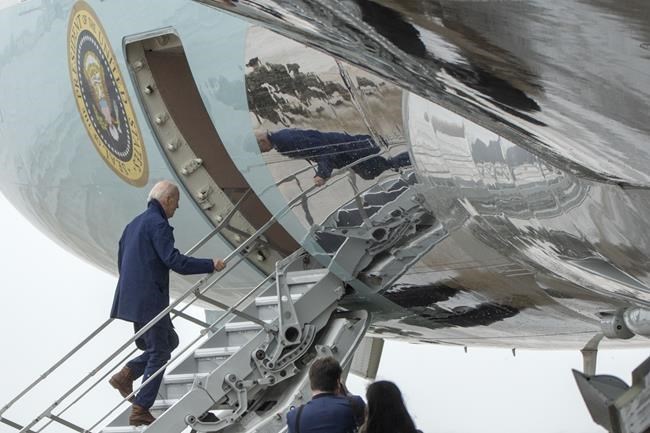WASHINGTON — Joe Biden made history Tuesday as the first modern U.S. president to visit a picket line, cheering on striking autoworkers in Michigan as part of a big-stakes play for blue-collar support in a vital electoral battleground.
Wearing a United Auto Workers ballcap with the words "Union Yes" emblazoned on the side, Biden used a megaphone to tell placard-waving members that he supports their bid for a larger share of healthy corporate profits.
"You deserve what you've earned," Biden said. "And you've earned a hell of a lot more than what you're getting paid now."
It's a one-stone, many-birds strategy: building a pro-union, manufacturing-friendly firewall around an industry central to White House policies on climate change, China and the U.S. middle class, with the added benefit of courting the very voters who helped elect Donald Trump in 2016.
Trump, for now the presumptive Republican nominee, will get his turn Wednesday, visiting a neighbouring county with what is sure to be a blistering attack on Biden's all-in effort to get more Americans to buy electric vehicles.
It's a fight that will be felt north of the border — and not just because it's happening on Canada's doorstep.
"The Biden administration is betting on union jobs being the catalyst for an EV transition," said Flavio Volpe, president of the Toronto-based Automotive Parts Manufacturers' Association.
"Canadian players need to understand that specific inflection if they want to understand how to stay in the sweet spot with unprecedented Treasury and regulatory intervention in the formerly free market."
In other words, manufacturers on both sides of the border need to treat their workers more fairly to avoid getting shut out of Biden's multibillion-dollar effort to transform U.S. industrial policy.
"Biden is focused on the labour movement and its inclusion in the upside," Volpe said. "Employers should recognize ... that his administration will see this as a priority, not an afterthought."
Trump is focused on auto workers, too — albeit in a dramatically different way.
"Joe Biden's draconian and indefensible Electric Vehicle mandate will annihilate the U.S. auto industry and cost countless thousands of autoworkers their jobs," he said in a statement Tuesday.
"With Biden, it doesn't matter what hourly wages they get, in three years there will be no autoworker jobs as they will all come out of China and other countries."
The former president is holding an evening rally in Clinton Township, Mich., a northern suburb of Detroit in Macomb County, where he triumphed in both 2016 and 2020 by a margin of about 11 and eight points, respectively.
It's meant, at least in part, as a counter-programming measure against the second official Republican presidential debate, taking place Wednesday in Simi Valley, Calif., which Trump has opted to skip.
But his recent zeal for savaging Biden's EV strategy, coming at a time when labour unrest is on the march in the U.S. and economic uncertainty shows no sign of receding, suggests Trump sees attacking electrification as a winning play.
There's one problem, said Eric Miller, a Canada-U.S. expert and president of the D.C.-based Rideau Potomac Strategy Group: the auto sector itself.
"They're in for over half a trillion dollars themselves — they have to make the EV bet work," Miller said.
"If this were the World Poker Tour, they'd be the guy in sunglasses and a hoodie standing up after he pushed all his chips into the middle of the table."
Miller also flagged the news Monday that Ford would suspend construction of a $3.5-billion EV battery factory in Michigan — a decision he attributed to Republican pressure over the use of technology developed by CATL, a Chinese battery giant.
"It was made clear to them, presumably in private, that it would be unwise for them to proceed with a deal that would see a Chinese company get millions of dollars in U.S. tax benefits," Miller said.
Trump, he noted, has been insisting for weeks that it would ultimately be China, not the U.S., that emerges as the dominant player in EVs as a result of the White House strategy. But Ford's decision belies that notion, Miller said.
"The very point of Ford cancelling this deal is to remove any doubt that somehow they're linked with an important, Beijing-backed entity."
And while it's not impossible that Trump, if elected, could make good on his threat to pull the plug on electric vehicles, he'd likely have a profoundly angry auto sector on his hands if he did so, he added.
"EVs are going to have an important place in the future," Miller said.
"Unless they start removing the tax credits and incentives ... which helped deal with the higher cost of EVs, then this process is going to continue, regardless of whoever's in the White House."
That, of course, remains an open question. Trump, undaunted by his mounting legal troubles and the prospect of a campaign littered with criminal trials, remains the clear front-runner in the race for the Republican nomination.
And most polling on the prospect of a Trump-Biden rematch suggests a dead heat, at least for the moment — not counting an "outlier" Washington Post-ABC News poll over the weekend that gave Trump a 10-point lead.
So what will Canada's auto sector do if Trump is elected?
"(We are) invested in all three countries, our companies are investors in 30 states and 10 provinces in three languages," Volpe said. "We'll handle what's coming as Team Canada."
This report by The Canadian Press was first published Sept. 26, 2023.
James McCarten, The Canadian Press



